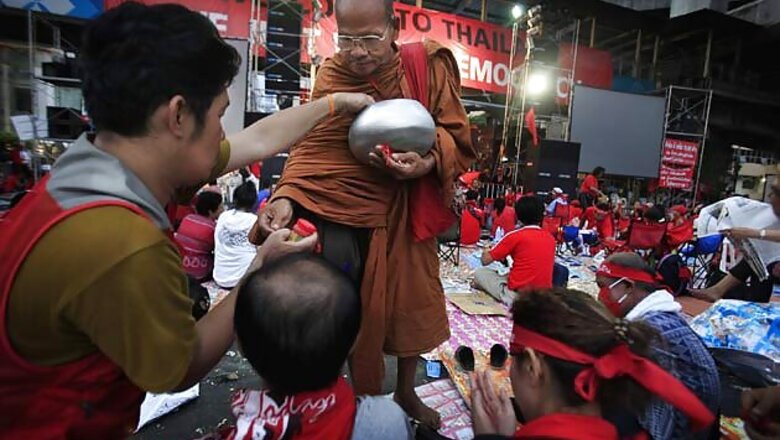
views
Bangkok: About 40 countries have issued travel warnings to Thailand as violent anti-government protests have been going on here for almost a week now. French broadcaster France 24 has shown footage of what it says are Thai forces firing at the crowd during the clashes.
The video shows two soldiers taking a horizontal aim with rifles and firing repeatedly. France 24 said the footage contradicted the Thai government's stand that soldiers only fired live in the air to disperse the crowd.
Thailand is locked in a political conflict that took a deadly turn on Saturday when government efforts to evict protesters from city streets turned into a savage nighttime battle between soldiers and demonstrators. Twenty-one people were killed and hundreds wounded. The demonstrators are standing fast and support for the government is fading quickly.
Some questions and answers about the crisis that has threatened political anarchy in the country:
Q. What are anti-government protesters in Thailand demanding?
A. The so-called "Red Shirt" protesters want Prime Minister Abhisit Vejjajiva to dissolve Parliament immediately and call new elections. They say he came to power illegitimately because his Democrat Party was not the top vote-getter in the last election in 2007. Military pressure on lawmakers of other parties allowed him to cobble together a coalition government in December 2008.
Q. What is the government's response?
A. Abhisit says he came to power through legal parliamentary processes. In two inconclusive rounds of talks with protest leaders late last month, he offered to dissolve Parliament by the end of the year. The timing would allow his government to pass a new budget and oversee the annual military reshuffle, which includes the appointment of a new army commander, one of the most powerful posts in Thailand, with a history of intervention in politics.
Q. Who are the major players in the conflict?
A. The Red Shirts, formally known as the United Front for Democracy Against Dictatorship, consist largely of supporters of ex-Prime Minister Thaksin Shinawatra and pro-democracy activists who opposed the 2006 military coup that ousted him after months of demonstrations. The anti-Thaksin protesters — led by the People's Alliance for Democracy, or "Yellow Shirts" — demanded he step down for alleged corruption and disrespecting the country's constitutional monarch, 82-year-old King Bhumibol Adulyadej.
Q. What are the roots of the problem?
A. The 2006 protests against Thaksin polarized the country. His party had easily won two elections amid popularity among the country's rural majority for initiating social and economic welfare programmes. Those who voted for Thaksin felt their votes were ignored after he was ousted from power.
Thaksin's political allies came to power in a December 2007 election to restore democracy, but courts forced two successive pro-Thaksin prime ministers out of office on grounds their supporters found dubious.
Thaksin's foes insist he was a corrupt megalomaniac who abused his power and tried to quash all opposition. They say he sought to usurp the prestige and influence of the respected monarchy.
The fault lines between rich and poor, city and countryside have led many to paint the conflict as a class war.
Q. How can the crisis be resolved?
A. It is likely some sort of compromise will ease tensions. Army Commander Gen. Anupong Paochinda indicated Monday he did not want to send soldiers in to try again to disperse demonstrators. The coalition partners in Abhisit's government could withdraw their support, or use that threat to have him call a new election soon.
The country's Election Commission has recommended that Abhisit's Democrat Party be disbanded for a 2005 electoral law violation, a move that would have to be upheld by the Constitutional Court. If that happens, Abhisit would be removed from office immediately.
Abhisit could undercut the Red Shirts' demands by calling an election on his own schedule, but earlier than the end of the year.
The standoff between Abhisit and the Red Shirts could also continue as a test of wills. That could lead third parties to intervene in the form of a coup by military officers unhappy with Anupong's non-interventionist stance.




















Comments
0 comment